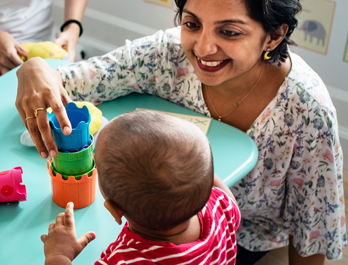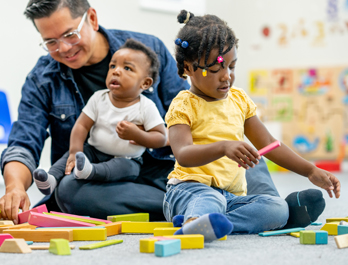Why Quality Care Matters
The early years of a child’s life are crucial for brain development. During this time, children’s experiences—through sensory exploration, social interactions, and play—significantly influence their cognitive, emotional, and social growth. High-quality childcare programs that provide enriched environments help stimulate these experiences, fostering skills like language, problem-solving, and emotional regulation.
Research shows that children who participate in such programs often perform better academically and have improved social skills. They also tend to have greater long-term outcomes in terms of education and career success. Investing in quality early childhood education is vital for giving children the best start in life.

What is Quality Early Care?
To prepare all children for kindergarten, Virginia’s early childhood system ensures that all children have quality teaching and learning experiences that meet their unique needs. In response to state law, Virginia has developed the Unified Virginia Quality Birth to Five System (VQB5) to measure and help improve the quality of all publicly funded birth-to-five classrooms and support families to choose quality programming across program types.
The VDOE provides resources and support for families, educators, and child care providers to enhance the quality of early childhood education. Through its efforts, the VDOE aims to ensure that children in Virginia have access to safe, nurturing, and high-quality learning environments.
Find a Program - Virginia Quality Birth to Five (VQB5)

Teacher/Child Interactions
Warm and stimulating interactions between teachers and children play a crucial role in early childhood development. Here are seven effective strategies for fostering these interactions:
- Responsive Communication: Teachers should engage in active listening, responding to children’s cues and questions to validate their feelings and thoughts.
- Positive Reinforcement: Providing praise and encouragement helps build children’s confidence and reinforces desired behaviors.
- Scaffolding Learning: Teachers can support children’s learning by gradually introducing new concepts and providing assistance as needed, promoting independent problem-solving.
- Play-Based Learning: Incorporating play into learning activities creates a fun and engaging environment, allowing children to explore and learn naturally.
- Emotional Support: Recognizing and addressing children’s emotional needs helps them feel secure, which is essential for their overall development.
- Individualized Attention: Spending one-on-one time with children helps build strong relationships and allows teachers to tailor their approach to each child’s unique needs.
- Encouraging Social Interaction: Facilitating group activities encourages cooperation, sharing, and communication among peers, which are vital for social-emotional growth.
These strategies not only enhance children’s learning experiences but also contribute to a nurturing atmosphere that supports their overall well-being.
Measuring Quality Interactions

Curriculum
A well-structured curriculum not only facilitates engagement but also fosters an inclusive environment where every child can thrive. By providing developmentally appropriate activities, educators can better support each child’s unique learning journey.

Play Based
High-quality early education focuses on creating rich, engaging environments where children can explore and learn across various developmental domains—cognitive, social, emotional, physical, and language. By offering diverse opportunities and materials, educators can foster curiosity and critical thinking, helping children build essential skills for school readiness.
For example:
- Cognitive Development: Activities like puzzles, building blocks, and storytelling encourage problem-solving and creativity.
- Social and Emotional Development: Group activities promote teamwork, sharing, and understanding emotions through play and interaction.
- Physical Development: Outdoor play, fine motor tasks, and sensory activities help children develop coordination and body awareness.
- Language Development: Reading, singing, and engaging in conversations support vocabulary building and communication skills.
These experiences are crucial in preparing children not just academically, but also socially and emotionally, laying a strong foundation for future learning.

Health, Safety, and Licensing
When choosing a child care provider, it is essential not only to consider their availability but also to ensure that health and safety are top priorities. A high-quality child care program should adhere to strict health and safety standards.
Here you can search for a program to see a list of state inspections and the results:
Public School Assessment Scores
Assessments are crucial in early care because they provide valuable insights into a child’s development, strengths, and areas where they may need additional support.
Virginia Kindergarten Readiness Program (VKRP)
VKRP Data Snapshots
Get In Touch
Connect with Thrive Birth to Five to learn more.
